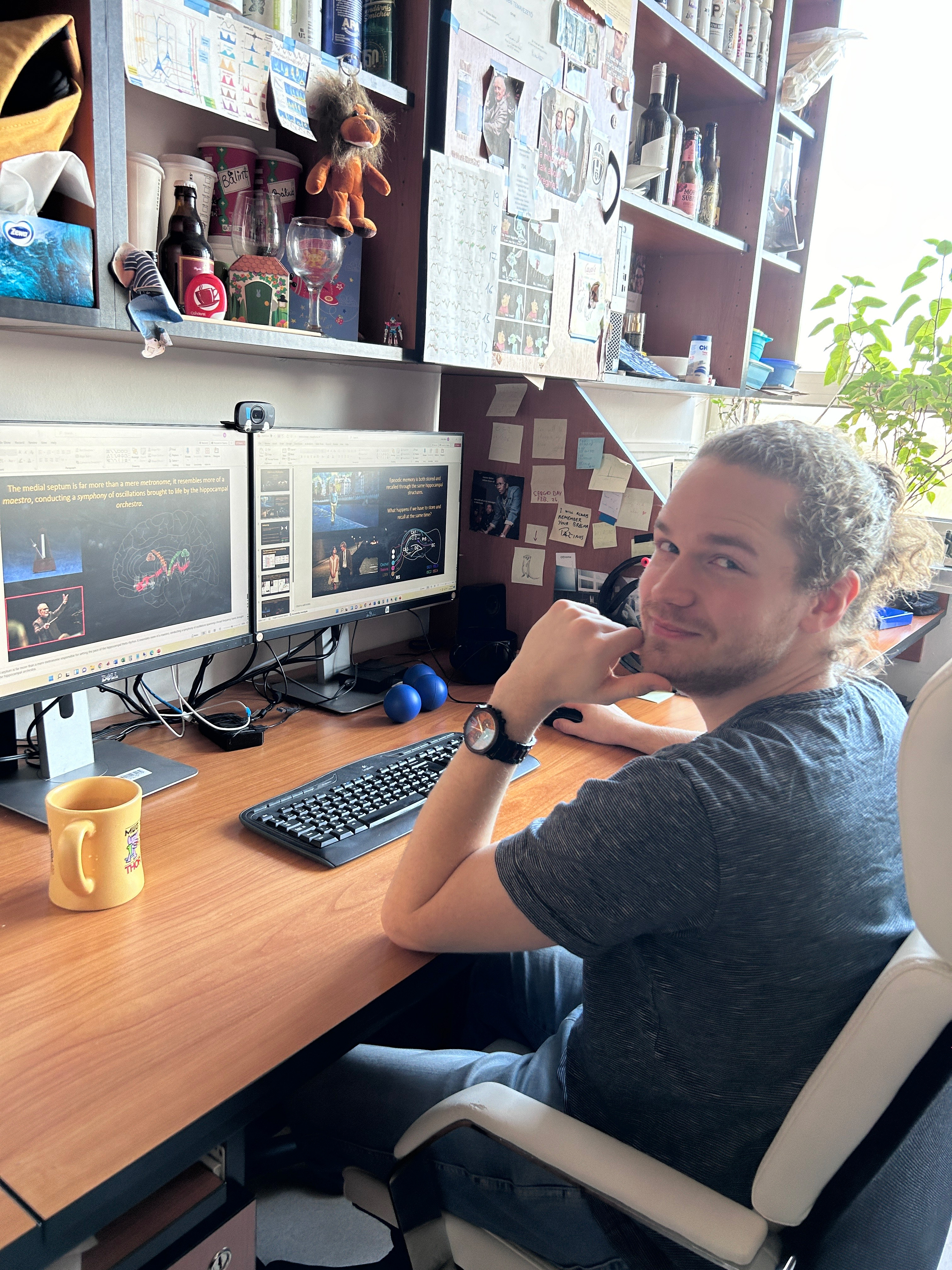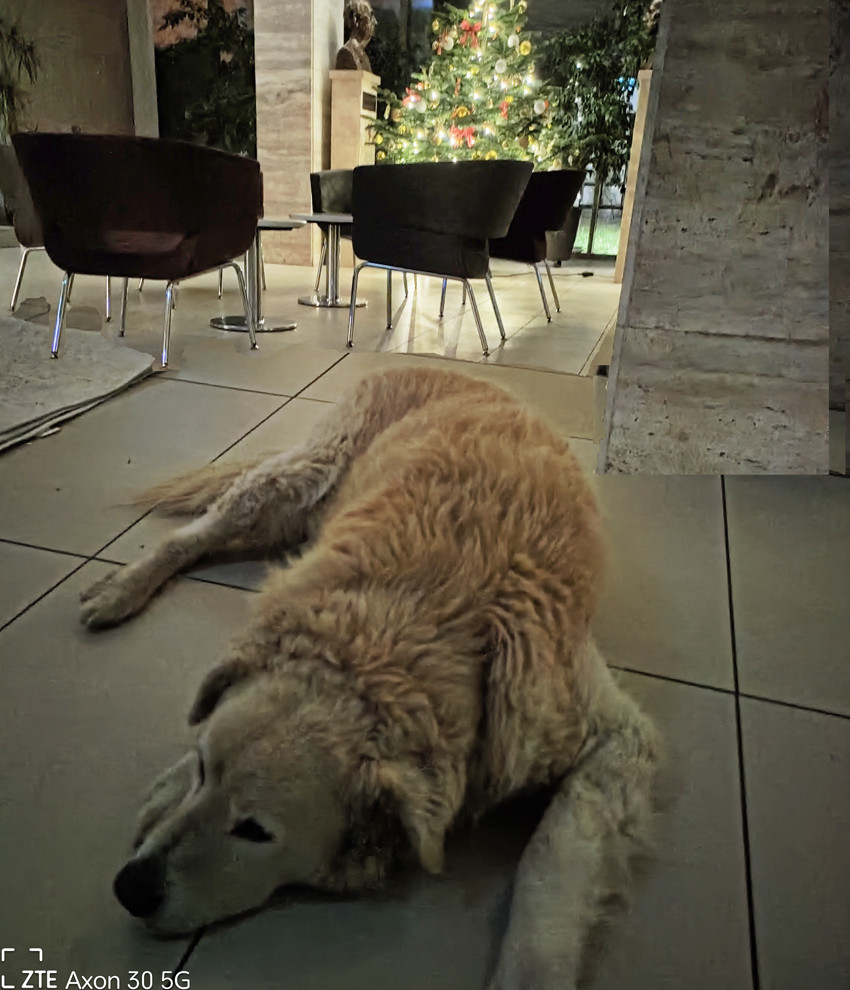Our Christmas celebrants: Bálint Király and Krisztián Zichó
There are many ways to celebrate, and Christmas is no exception. And in a scientific institute, no Christmas celebration is complete without a scientific lecture.
Although it is tempting to reflect a little on how this holiday has evolved from the pagan celebration of the winter solstice, through the Christian celebration of the birth of Jesus, to the very temporary and discarded pine tree celebration, which was only introduced in Eastern European countries and is now a very temporary event, to the current state of gift-buying and compulsive eating and drinking, aggravated by the trademark Santa Claus or Santa Claus, which is increasingly being used not only abroad but also in our country, let us rise above this and talk about science!
True, at our institute's Christmas party on 15 December 2023, there was also a chance to eat and drink, and even dance for those who wanted to, after many years, but only after our director and deputy directors - academics Zoltán Nusser, Beáta Sperlágh and László Acsády - had reported on the most important events of the past year for our institute.
In addition to the quality of the scientific results, the number of publications, and the honors and awards received by our staff last year, we also heard about what we have done to ensure that the goals and achievements of our Institute and the importance of our research activities, in general, are more widely known, recognized and respected.
The official part of the ceremony was concluded with a great scientific lecture of about 5 minutes, understandable for non-scientists, which they still remembered even if they could not repeat what they had heard, but they understood everything during the short lecture. For this reason alone, Krisztián Zichó deserves our congratulations! He was allowed to give this lecture by the Board and Scientific Council of our institute as a reward for his first-authored paper in PLoS Biology. Krisztián Zichó, a member of Gábor Nyiri's group, presented their work that revealed a previously unknown mechanism by which the cerebral cortex, through the involvement of a brain area in the brainstem, called the nucleus incertus, helps the hippocampus to recall fearful memory traces.
Also to be congratulated is Bálint Király, the first author of the other major discovery published in 2023 (Király et al. Nature Communications), who also won the Institute's Young Investigator Outstanding Publication Award, which allowed him to give a presentation, only to be prevented by his illness.
However, nothing could prevent both of them from answering a few simple questions.
- What would you have talked about in your presentation?
Bálint
- About our discovery that the medial septum controls a very broad frequency spectrum of hippocampal oscillations and thus plays a crucial role in coordinating hippocampal memory processes with flawless precision and unconscious speed. While a previous model compares the medial septum to a metronome dictating the tempo of the hippocampal theta rhythm, our discovery instead suggests a network where the septum is a dirigent conducting a complexly interconnected symphony of oscillations, in integral connection with the entire hippocampal orchestra.
- I am sure that the audience at our institute would have been very pleased with your presentation! Unfortunately, the performance was canceled this time, but of course, you received the prize. How much did you expect and count on the prize, as everyone knew what announcements had been made last year?
 Bálint
Bálint
- I didn't expect the prize, or to be more precise, I didn't think about it at the moment. To be honest, it's not the first Nat. Comm. announcement and it had crossed my mind, but then I realized that I shouldn't think like that.
Krisztián
- I was not expecting this award either, so it was a pleasant surprise. I think there were quite a lot of high-quality first-authored papers from KOKI last year, written by young researchers, so I didn't expect mine to be one of the winners. In any case, I was very pleased, it was a great honor and I can't be grateful enough.
- Moving on from this award, what are your views on similar awards given by institutions to their researchers?
Krisztián
- I think it is a very good idea to recognize emerging young researchers within an institute in this way. Even just mentioning your name at the institute's annual review can be motivating for many. To highlight a few young people who have had several years of work published in a prestigious journal and give them a special award is very motivating. The prize established by our institute is a nice recognition, both professionally and financially. On the other hand, I think it is also important. It allows us to identify talented people within the Institute and perhaps to take a little more notice of their research area and their subject.
Bálint
- If you get recognition for your work/results that's great, but the main thing is that I'm happy with the article, work with others in a good atmosphere and the result adds something to our knowledge about the brain. Although a prize could never compensate for the lack of these, and I think I am by nature not motivated by prizes, I still think it is good and very important to have such awards.
- So all in all, you feel that awards are useful!
Krisztián
- Yes, from the smallest to the biggest, I think they are all important. Prizes are important confirmation for researchers, not only when they are young, but also later on, that all the work they put into experimentation and brainstorming is paying off and that their research is on the right track. In research, where failures due to the nature of experiments are commonplace, positive reinforcement is important.
Bálint
- Our work is primarily based on self-motivation. Our projects are endless, feedback is rare and without such awards, one can sometimes feel that the recognition of one's work is lagging. Especially, if that person is still a student.
- Your responses show total agreement! How would you end - also in full agreement - this short little discussion?
Krisztián
- We think it is important to underline that although most of the awards are given to one person, it is not only the work of the person who receives the award, but the whole group, including researchers, assistants, and the subject leader, as I mentioned at the award ceremony.






